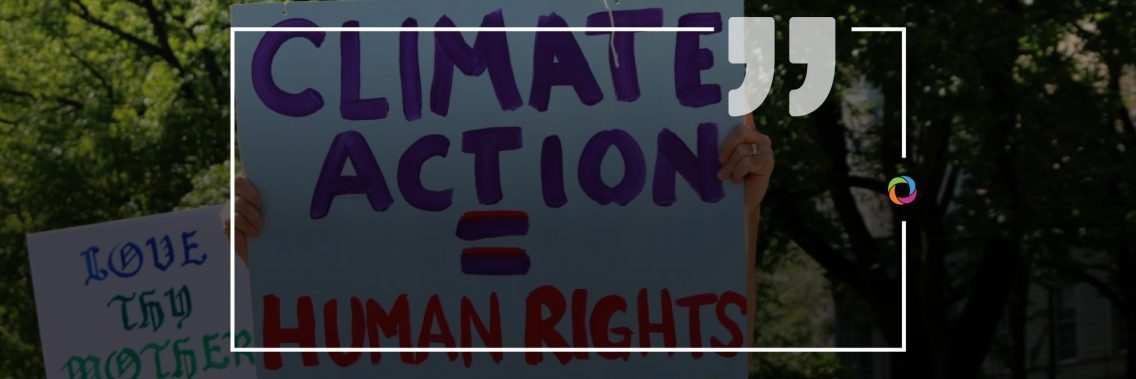The worst enemies that humanity has to fight are those that are invisible. Climate change is a reality that now affects every part of the world. A clean, healthy, and functional environment needs to be guaranteed for several important human rights such as the right to life, health, food and an adequate standard of living. The latest assessment report from the Intergovernmental Panel on Climate Change (IPCC) describes how predicted changes in climate will adversely affect billions of people, their ecosystems and natural resources, and the physical infrastructure upon which they depend. We asked the opinions of several experts in this regard.
How exactly does climate change affect human rights?

“In a polarized and economically divided world, climate variability hinders people’s resilience. Developed countries have the means and resources to mitigate the effects of climate change (despite the fact that within their borders the social division could make it difficult for poor people or migrants to access resources or minimum conditions of safety) unlike the developing countries that do not have such resources, making the living conditions of their citizens even more difficult. The serious situation of climate migrants (climate refugees) and victims of social inequities and global change, due to having to live in foreign conditions (even if they are internally displaced) forces them to live in places susceptible to natural disasters, to be victims of disease and famine, reducing their life expectancy. People in this category end up being discarded by state care policies and not considered as recipients of humanitarian aid.”

“Climate change affects a range of human rights guaranteed in various international human rights instruments including the International Covenant on Civil and Political Rights (ICCPR) and the International Covenant on Economic, Social and Cultural Rights (ICESCR). These rights include but are not limited to the right to life, the right of self-determination, the right to food, the right to an adequate standard of living, the right to development, the right to education, and the enjoyment of the highest attainable standard of physical and mental health. Remarkably, more than two-thirds of the states in the world is party to these both binding treaties. The groups that climate change affects the most are those who are vulnerable such as peasants, fishermen, pastorals, women, children, and people with low income.”

“Climate change is that invisible enemy that is only going to grow in its viciousness, irrespective of the actions taken today. It violates human rights to a degree that is not possible to comprehend. Climate catastrophes threaten the fundamentals, such as the right to life and personal safety with millions unable to escape the unforeseen wickedness every year. With millions more displaced, without any means to support their livelihood, they are met with inhumane conditions in which to survive, forcing them to forfeit their right to liberty and equality. The same conditions expose these individuals to degrading treatments and subject to discrimination with no other option to hand. But perhaps no one can imagine the extremes that climate change leaves children’s rights vulnerable to.”

“Climate change is already threatening human rights for millions of people around the world but these impacts will worsen and affect millions, if not billions more without a human rights-based approach to mitigation and adaptation. Extreme weather, rising temperatures, rises in sea levels, drought, and ecosystem collapse threaten human rights to life, self-determination, development, water, and sanitation, food, and housing. The right to life is already being threatened for those communities living in low-lying areas exposed to rises in sea levels and extreme weather. Poorer people are more likely to live in housing that is vulnerable to extreme weather and have less resources or opportunity to adapt. These impacts disproportionately affect vulnerable and marginalized people and groups as well as future generations who have contributed little or nothing to the problem.”

“The deleterious effects of global warming and climate change are being experienced now on a global scale, through natural disasters such as: hurricanes, landslides and floods. When observing the effects of climate change in the long term, there will be more continuous disintegration of the environment. The ominous effects are already being felt in various areas such as: agriculture, food and security, biodiversity, ecosystems, water resources, human rights, human health; human settlement, migration patterns, energy, transport and industry. Global warming and extreme weather conditions have had catastrophic human rights consequences for millions of people. The various effects of global warming are: world hunger, malnutrition, exposure to disease, and declining access to water.”

“In my opinion, climate change restricts and, in some ways prohibits, the basic human rights that the international community has agreed to enforce, such as the right to life, liberty, and nationality. Climate change has created a massive displacement of environmental refugees around the world and is likely to displace many more.”
What obligations does the international community have to respond to the human rights implications of climate change?

“Dialogue and legislation have not been generated within the UNFCCC for the official recognition of displaced persons or climate migrants as the real victims of climate variability. It is necessary to generate pressure, in the international arena, so that states and international cooperation recognize their responsibilities and allocate economic and technical resources for their protection. Throughout the world they are currently considered as economic migrants, making their vulnerable situation invisible. The distribution of wealth and access or technological development has a contrast between the countries of the global North and South, where the latter do not have enough economic resources or access to cost-free patents and facilities to develop technology for the mitigation of and adaptation to climate change, according to the local reality.”

“There are three key human rights principles: Protect, Respect and Remedy. Within the framework of these principles, states must take measures to protect people from the effects of climate change, respect their environmental rights and provide remedies for human rights violations caused by climate change effects and environmental degradation. Most importantly, states must ensure that climate actions correspond to the existing human rights obligations and principles, most importantly the principle of non-discrimination so that the response can stay just, participatory and inclusive.”

“An immediate response that would resolve human rights violations all at once does not exist. However, it is crucial that people from different parts of the world come together and be a part of the collective solution, for we all are human and know what is unacceptable to a living being. International entities have perhaps the biggest role to play in this. The United Nations, in particular, needs to be much more vigilant and responsive towards such reports of violations in different parts of the world. They need to acknowledge and address the needs of such people and make sure that their requirements are met, through international or national means. Budget allocations under the Green Climate Fund and Common but Differentiated Responsibilities (CBDR) should particularly address the economic distress among the affected group which makes them subject to human rights violation. UNHCR and Human Rights Watch must come together to provide decent living and working conditions for the affected group of people. Technology at the international level has to be shared and made use of to predict climate disasters more accurately allowing us to take precautionary measures beforehand and lower the risks.”

“As the Office for the High Commissioner on Human Rights has made clear, states are obligated by international law and agreements to “respect, protect, fulfill and promote” human rights for all persons without discrimination. States must take immediate, ambitious action to curb greenhouse gas emissions to reduce future harms and ensure that people have the ability, resources, access to services, livelihood options, and political decision-making (commonly referred to as adaptive capacity) to realize their economic, social and cultural rights. States are obligated to act individually and collectively, to protect rights-holders from transboundary climate impacts, mobilize resources for vulnerable states, indigenous peoples, and communities and provide capacity and coordination. The international community, such as multilateral organizations, international finance institutions, and non-governmental organizations, can provide support (finance, capacity building, convening) and pressure (greater international monitoring and accountability, stipulations on finance, elevating the voices of the communities whose rights are being violated). “Just transition” dialogues, which are gathering momentum at the country level and in international forums, should reflect a human rights-based approach to redress existing harms and ensure procedural rights in decision-making.”

“The international community as a whole must avoid the causes of climate change to prevent the consequences of climate change such as the displacement of people that often results in human rights violations. And with all the hardship and loss of security and some freedoms that being a refugee entails, and because we also all know that climate change is preventable, international organizations around the world are not living up to the promises written in the Universal Declaration of Human Rights and therefore a cycle of disasters will continue happening until we choose to stop what started it all in the first place.”

The Universal Declaration of Human Rights, The International Covenant on Civil and Political Rights, and various human rights entities do in fact require countries to assure operative solutions for human rights violations. Climate change and its various effects have had massive impacts on human rights, with occurrences of droughts, hurricanes etc. that have resulted in loss of lives and homes. There should be steady focus in efforts that will in fact reduce the vulnerability level of people on an international scale in tackling the issue of climate change. There should be fitting measures taken to safeguard and achieve the protection of all persons, predominantly those most vulnerable and endangered by the obstructive impacts of climate change.
Check out more than 450 job opportunities in the Environment & NRM sector here.

